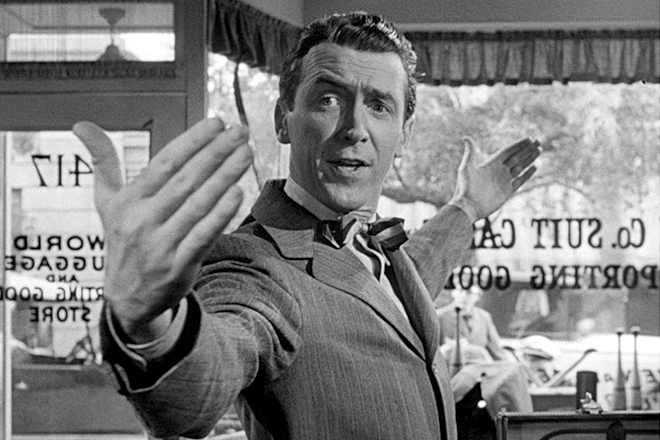Nov 18, 2016
The George Bailey Test
Most of us know the story all too well. In the famed holiday movie, It’s a Wonderful Life, we witness a classic battle of good and evil. George Bailey has grown up in Bedford Falls and wants desperately to leave, to start a new life, and get on with living, just like his older brother. But, we learn quickly in the movie that George Bailey is perhaps the only person in Bedford Falls uniquely qualified to save the city from the dreaded Mr. Potter. Foregoing a honeymoon and a fresh start in a new city, George saves the bank – and the community – from collapse on that dreaded day when there was a rush on the bank.
But, what would have happened if George would have left? What if he had not used his honeymoon money to save the bank, keeping it open, and creating true competition in the marketplace against Mr. Potter? Later in the movie we had a chance to see what that would look like, when George had a dream – or a nightmare – of what would have happened if his life had not been lived. And, as the dream unfolded, Bedford Falls had turned into Pottersville – a community of low-life villains. It turns out that George Bailey was perhaps the most uniquely qualified person in a community to bring about transformational change and forward movement. And, without him, there was no catalyst to face Mr. Potter.
If George Bailey did not exist, Bedford Falls would likely not exist.
We can learn a lot from It’s a Wonderful Life. What would happen if you drove up to your school, college, or non-profit and it was gone tomorrow? It was a life never lived. It never existed. Who would be the bigger losers – the current faculty and students – or the larger community?
Independent schools and colleges do not have a divine right for existence. They must continue to inspire and be relevant to changing times, making valuable contributions to the outside world through their work. And, an extraordinary and inspiring vision is necessary to do this.
An inspiring vision must be relevant. It cannot be about the organization, but rather about contributing to the greater community a valuable solution to a unsolved problem. Most of the world’s greatest organizations are effective because they have extraordinary visions. Consider these examples:
- Google – To organize all the worlds information and do no harm in the process.
- Apple – To constantly challenge the status quo.
- Southwest Airlines – To open the skies.
There is a lot we can learn about our organizations by applying The George Bailey Test. It gets right down to heart of relevance. And relevance is ingredient number one in creating a great vision.


Without Father Ryan students would have not received the benefit of a Catholic high school experience. A holistic approach to understanding the importance of "we" in a world of "me." Other schools can provide quality academic instruction, enable students to be accepted at highly rated universities and provide alumnae with connections to advance their careers. Ryan has consistently provide the Catholic prospective of the need for service and sacrifice.
First I want to answer the question from the view of the immediate surrounding community. From my limited knowledge and time at THS as a student, it has very little impact or engagement with the immediate community other than its students and families. Thus, if the Haverford School were a shopping mall, I am not sure the surrounding would be affected at all. This in my opinion is a problem.
Now let’s see this from a perspective of the entire Philadelphia area. Even though, the school is making huge strides to engage with the community and not only help others but give our boys a more in depth experience of the "real world", I think the existence of THS has little impact on the entire region as a whole.
Now, looking at this question with a more optimistic view, I know THS gave so many boys (including myself), the the foundation and tools to improve themselves, succeed in so many avenues of life and in turn affected so many people in a positive manner locally, nationally and internationally especially for those students that received aid and would be unable to attend such a prized institution. Without THS, these financial aid students would not have been able to forge this foundation where non-aid students would probably have found similiar opportunities elsewhere.
In conclusion, THS’s ability to enroll the best and brightest students in the area regardless of economic factors will impact the amount of impact of its existence.